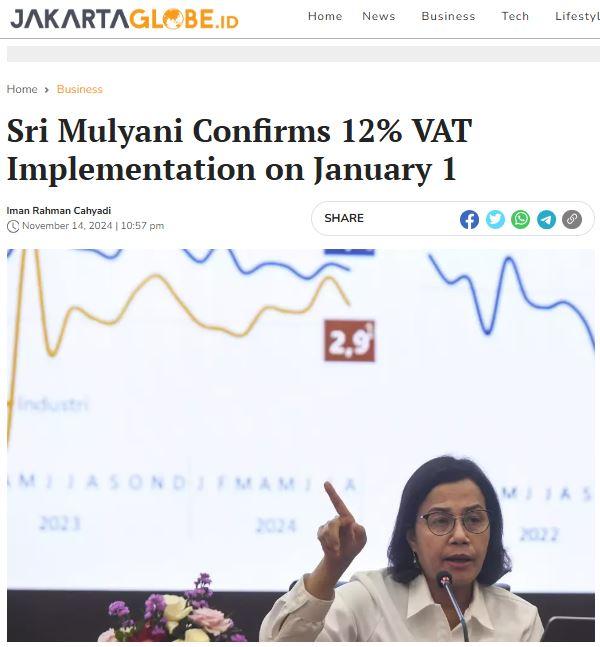Indonesia’s 2025 VAT Rate Increase: Strengthening Fiscal Foundations for National Development

By: Dewa Made Yoga Dwi Permana, the Directorate General of Taxes officer
Starting from 2025, Indonesia will implement an increase in its Value Added Tax (VAT) rate. The provision is regulated by Law Number 8 of 1983 on Value Added Tax of Goods and Services and Sales Tax on Luxury Goods as amended several times with Law Number 7 of 2021 on Tax Regulation Harmonization. It was prepared by Indonesia Maju Cabinet under the leadership of President Joko Widodo. In the regulation, it is stated that VAT rate will be increased in stages. First, it will increase to 11% on April 2022 and to 12% on January 2025. This increasing is designed as part of series of fiscal reforms targeted to boost state revenues and to support ongoing development projects. This article explores the motivations behind the change, the structure of new tax rate, and the potential impacts on businesses, consumers, and the broader economy.
Indonesia’s VAT system
What is Value Added Tax? Value Added Tax is a consumption tax levied on the value added at each stage of production and distribution. In Indonesia, VAT applies to most goods and services. Entrepreneurs are responsible to collect it from the consumers. The owed VAT is calculated by crediting input VAT levied on the purchases from output VAT levied on the sales. Entrepreneurs have to issued tax invoice in order to collect VAT from the consumers, except when they are retail goods sellers.
Why Is Indonesia’s VAT Rate Increased?
Indonesia’s increasing VAT rate as regulated in Law Number 7 of 2021 aims to strengthen fiscal sustainability. As one of Southeast Asia’s largest and most rapidly growing economy, Indonesia faces increasing public spending needs, particularly in infrastructure, health care, and social protection. As the President changed in October 2024, there were some changes in some programs taking part in our budgetary site, such as free lunch for the society and the sustainability of building the Capital City of Nusantara (IKN).
Key Factors in 2025 VAT Policy
The VAT rate increase in 2025 to 12% impacts a broad range of goods and services. However, exemptions still apply to essential items, such as basic foodstuffs, education, dan medical services, to limit the burden on low-income households. The policy also includes provisions to minimize the impact on small businesses in the form of certain threshold exemptions or simplified compliance requirements.
The Ministry of Finance has emphasized several key factors that motivate the VAT rate adjustment, such as addressing development needs, enhancing fiscal sustainability, and maintaining regional competitiveness.
In addressing development needs, Indonesia faces growing demands for public investment in infrastructure, health care, and education. The VAT rate increase will ensure a steady revenue stream to fund these critical areas and enable equitable access to essential services for all citizens.
In enhancing fiscal sustainability, by raising domestic revenues, the government reduces reliance on external borrowing. VAT reform strengthens fiscal stability, ensuring Indonesia remains resilient in facing global economic uncertainties.
In maintaining regional competitiveness, by applying 12% VAT rate, Indonesia will be able to remain competitive in Southeast Asia. It will ensure Indonesia to remain attractive for investors while aligning with global best practices for taxation.
Key Features of 2025 VAT Reform
The Ministry of Finance has designed the VAT rate increase to minimize negative impacts on the economy while maximizing its benefit. This is a necessary step, or else the market will fall down and we will find out that our citizens cannot afford their needs. The expected key features in immediate time are protecting vulnerable goods, simplifying compliance for businesses, and strengthening local products.
The first key feature is protecting vulnerable goods. Essential goods and services such as basic foodstuffs, education, and health care remain exempted from VAT to safeguard low- to middle-income households from undue financial strain.
The second key feature is simplifying compliance for businesses. Small and medium-sized enterprises benefit from streamlined VAT reporting and reduced administrative burdens. It will ensure that businesses can adapt smoothly to the new rate without significant operational disruptions.
The third key feature is strengthening the local products. Government has to prioritize the local products instead of importing some goods from other countries. It will increase the interest of farmers, breeders, or fishermen to produce and to support the state’s essential goods stock. Furthermore, if the stock already exceeds the domestic needs, we can export the goods.
Vision for The Future
The VAT rate increase is a cornerstone of Indonesia’s fiscal reform agenda. By optimizing domestic revenue, the Ministry of Finance aims to create a self-reliant economy capable to meet its development goals without over-reliance on external financing.
The Minister of Finance Sri Mulyani Indrawati stated, “Tax policies, including the new VAT rate, have been carefully designed, taking into account the health sector and the basic needs of the people.” She stressed the importance of keeping the state budget "healthy" to address potential financial crises and ongoing geopolitical tensions. (JakartaGlobe.id)
The 2025 VAT rate increase reflects the Ministry of Finance’s commitment to balance the short-term economic needs with long-term national aspirations. Through prudent fiscal management, the Ministry of Finance aims to ensure that Indonesia remains on track to achieve its vision of equitable and sustainable development.
*)Artikel ini merupakan pendapat pribadi penulis dan bukan cerminan sikap instansi tempat penulis bekerja.
Konten yang terdapat pada halaman ini dapat disalin dan digunakan kembali untuk keperluan nonkomersial. Namun, kami berharap pengguna untuk mencantumkan sumber dari konten yang digunakan dengan cara menautkan kembali ke halaman asli. Semoga membantu.
- 5728 kali dilihat
